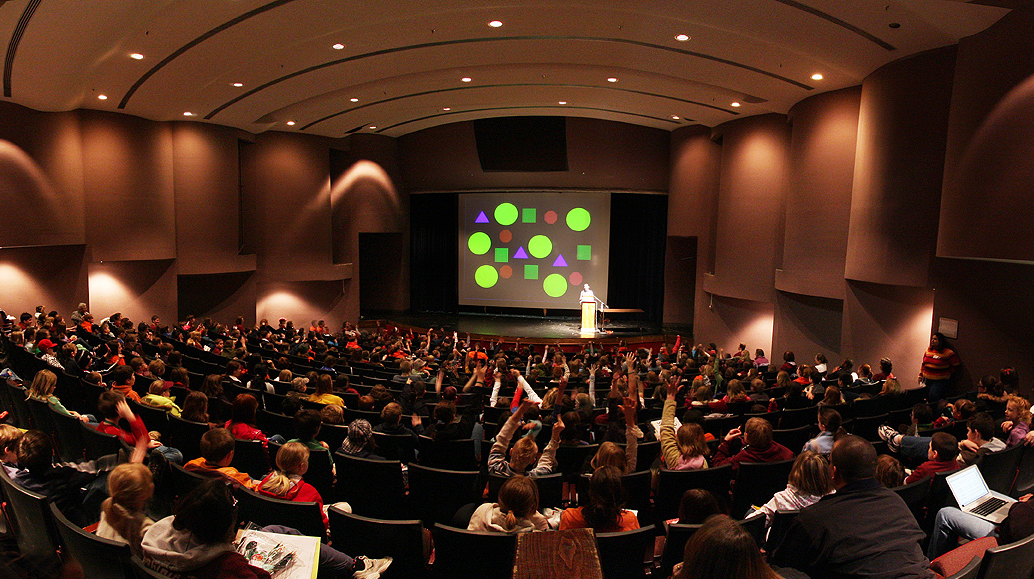Children at Kids' Tech University learn why computer programs can be so frustrating

Last Saturday, around 400 children, aged 8 to 12, descended on the Haymarket Theater in Virginia Tech's Squires Student Center to take part in Kids' Tech University.
John Dooley, vice president for outreach and international affairs at Virginia Tech, welcomed the young students to the second installment of the pioneering educational program that is designed to excite children about science, technology, engineering, and math.
“We want all of you to have this wonderful university experience as a way to inspire you to go to college. We want to encourage you to follow your dreams,” said Dooley. “I believe there is a group of scientists in this room that will discover things that will change the world. Do the very best you can.”
Virginia Bioinformatics Institute and Virginia Tech Mathematics Professor Reinhard Laubenbacher, the pioneer of the Kids’ Tech University program in the United States, introduced the day’s guest lecturer. Caitlin Kelleher, assistant professor of computer science at Washington University in St. Louis, answered the question “Why are some computer programs so frustrating?”
Kelleher guided the children through several examples of how bad computer program design or project management could lead to unwanted if not catastrophic outcomes – from the design of computer control systems for aircraft to a theoretical project to make the world’s best hammer.
Kelleher told the students that to design computer programs you have to understand situations in great detail. “Good computer program design must take into account what people will do in real life situations. Remember what works for you may not work for others. If it does not work, don’t blame the user. Build a better tool.”
The children were shown how computer science has uses in many fields – from life-saving applications in a hospital setting to helping kids learn to read. They were also shown how computer programming could help reveal when a computer-animated dragon was getting seriously hungry.
Kelleher is chief architect of the software program Storytelling Alice. She took some time walking the children thorough a demonstration of how the program works. Storytelling Alice enables kids to create their own stories and gives them a taste for computer science. The children showed different levels of enthusiasm when Kelleher revealed the plot to her story – two kids fall in love but are discovered by the school lunch lady, who promptly brainwashes the boy into forgetting all that happened. The program participants were captivated by the computer animation and programming needed to bring the story to life.
The children had a lot of questions – from the nitty-gritty of how you can add music files to Storytelling Alice to how much time it takes to make a computer software game. Asked by one child why she wanted to become a computer scientist, Kelleher replied: “I always wanted to make the world a better place, in much the same way as a doctor or teacher. If you design a really great computer tool that makes things better, you can perhaps help millions of people in a very short time.”
In the afternoon, the kids took part in hands-on sessions at The Inn at Virginia Tech. They were welcomed by Jesse Johnson, the Armored Hokie, and treated to a host of demonstrations by Virginia Tech’s Ware Lab, Virginia Tech Amateur Radio Association, Virginia Tech’s Assistive Technologies, Virginia Tech Transportation Institute, Computer Science Community Service, Virginia Tech Collegiate 4-H Club, Virginia 4-H Rockbridge and Craig Counties, Sigma Alpha, and many others.
“We have been overwhelmed by the enthusiasm of the children for Kids’ Tech University and the generosity of the many volunteers in and beyond the Virginia Tech community who are helping to make this project so rewarding. You can sense the excitement of the kids in the lecture room. They have so many questions it makes you feel very humble,” said Laubenbacher.
Kids’ Tech University is a groundbreaking program for kids between the ages of 8 and 12 that gives children the opportunity to enroll in university courses taught by established scientific researchers who also have a strong track record in the communication of science. The goal is to expose kids early to science, math, engineering, and technology subjects in a setting that children find both exciting and fun. The program serves as a new model for science education in the United States. A European educational program, Die Kinder-Uni, which was started a few years ago in Germany, is part of the inspiration for Kids’ Tech University. Kids’ Tech University offers real lectures by real professors in a real university setting.




